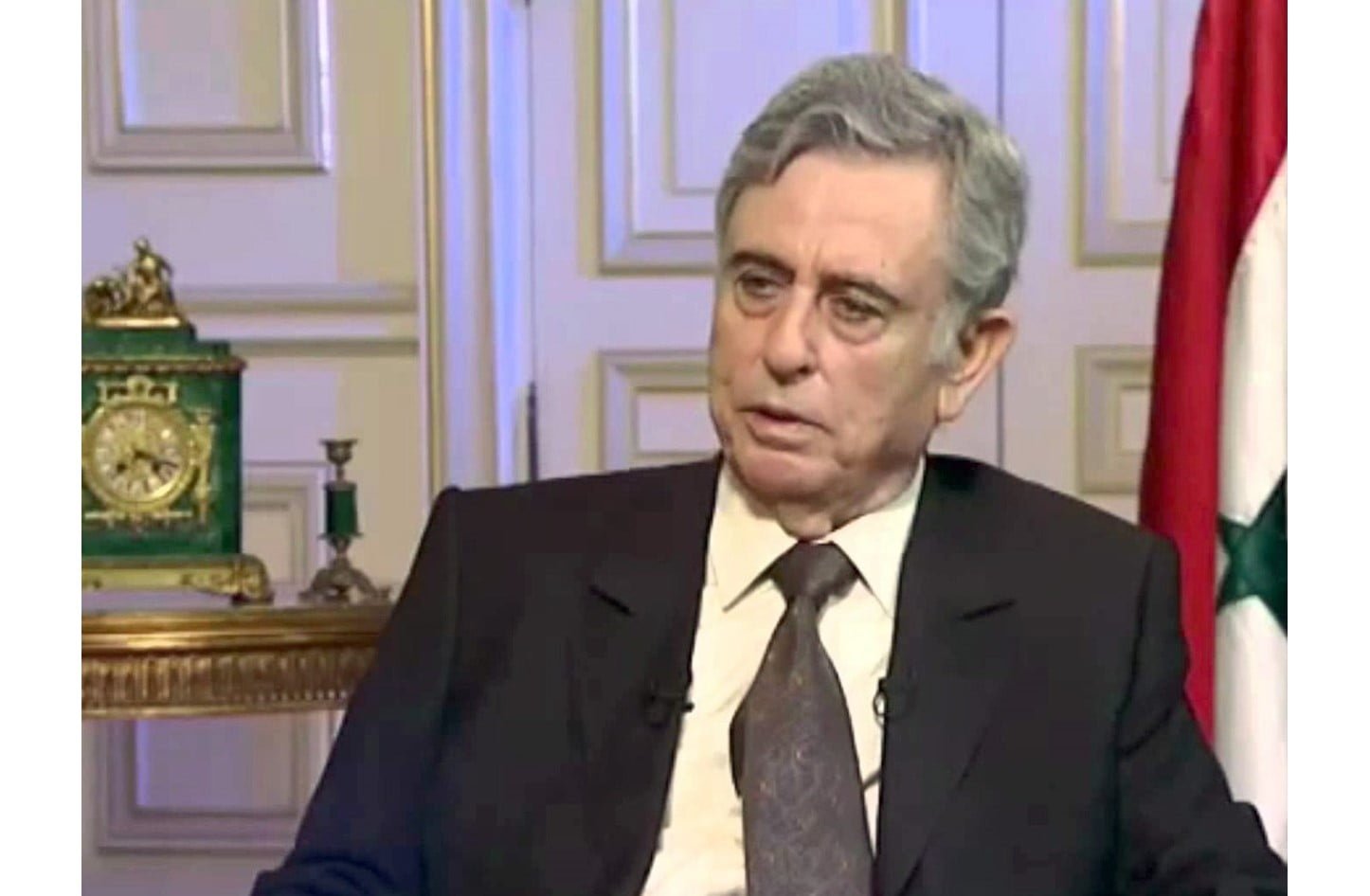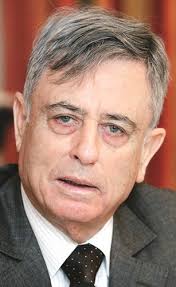khaddam: Bashar al-Assad’s response to reform projects was that it requires a national conference for the party, and the circumstances were not suitable at that time. He realized then that reform was not feasible.
Q1: What is the most important thing that will come in your upcoming memoirs…?
A1: My memoirs are not just a presentation of isolated facts during the period when I was responsible for foreign policy, which extended from November 1970 to the period that ended after my resignation from my leadership positions in the party and the state on June 5, 2005. These memoirs contain the history of that period with all the events, meetings, and contacts, divided into the following topics:
A – Conflict with Israel
B – Lebanon and its events
C – Syrian-Egyptian relations
D – Syrian-Iraqi relations
E – Syrian-Iranian relations
F – Syrian-Soviet relations
G – Syrian-American relations
Q2: What impact do you expect after their publication…?
A2: I have strived for accuracy and credibility in writing these memoirs, depicting events and facts as they occurred. I believe the reader will see facts and events reflecting the truth, rather than what was often read.
Q3: You spent 37 days as acting President of Syria, a period of great sensitivity in Syria’s recent history. Can you tell us what happened during that time…?
A3: During those days, after the death of President Hafez al-Assad, and his son took over the reins of power, Syrians were in a state of anticipation and wondering about what the new president would do. Would he continue his father’s path or bring about political and economic changes in the country? Some were highly optimistic, while others were pessimistic.
Q4: You mentioned that Syria was involved in the assassination of Hariri. What are the evidence for that…?
A4: After the establishment of the Special Tribunal for Lebanon and the appointment of the international investigator, the case fell under the jurisdiction of international justice. The international investigator has made significant progress, and discussing the case’s details after the establishment of the international tribunal might not be helpful.
Q5: How is your life in France now, especially after you were sentenced to 13 life imprisonments by the Military Criminal Court…?
A5: I live in France like any politician residing outside their country. The sentences issued by the Military Criminal Court hold no weight.
Q6: Do you believe that General Ghazi Kanaan, who handled Syrian-Lebanese relations, was murdered or committed suicide…?
A6: I have no information about the death of General Ghazi Kanaan. He was close to Dr. Bashar al-Assad and was appointed Minister of Interior, but in recent months he became very unpopular. Many interpreted his death as an assassination, but the truth can only be determined through an autopsy.
Q7: It’s said that you had a close relationship with Rafik Hariri, involving business partnerships and a family link. What is the nature of your relationship with Hariri…?
A7: I met Rafik Hariri in 1981, and we discussed the situation in Lebanon. He was interested in what was happening in Lebanon and visited Syria to meet with Lebanese leaders. Our friendship developed, and he offered services to Syria in various fields. There were no economic relationships or family ties between us.
Q8: What was your stance when you were in Syria and held various positions regarding amending Article 83 of the constitution…?
A8: When President Hafez al-Assad passed away, I was outside Damascus on vacation in my coastal city. There was a scheduled meeting between me and President Hafez for Saturday. I left my city to go to Damascus, and upon arriving at my house in Damascus, I was informed that the palace had requested my presence hours ago. When I called the palace, I was told they were waiting for me at President’s house. It was then that I realized President Hafez had passed away, as I was aware of the deterioration of his health. I went to his house and saw cars of the Qatari leadership in front of it. Upon entering the house, I found all members of the Qatari leadership, including Dr. Bashar al-Assad. The Qatari Deputy Secretary (Suleiman Qadah) informed me that the Qatari leadership had decided to nominate Dr. Bashar al-Assad for the presidency and amend Article 83 of the constitution. The Speaker of the People’s Council had summoned an urgent session to approve the constitutional amendment. It was natural for me not to object, as President Hafez al-Assad had been planning the transfer of power to his son for years, particularly within the army, security agencies, and the party.
Q9: The French newspaper “Libération” stated that there is American thinking aiming to change the government system in Syria with you at its head. What is your comment…?
A9: The Syrian opposition agrees that any change in Syria should be a national change, not through external intervention, as that poses significant dangers to the country’s future.
Q10: What is the ideological composition of the members of the National Salvation Front that you established to overthrow the Syrian regime…?
A10: The ideological composition of the members of the National Salvation Front in Syria included representatives of various ideologies existing in Syria. However, the withdrawal of the Muslim Brotherhood from it left no representation for the Islamic current.
Q11: Is it true that you were one of those who helped facilitate Bashar al-Assad’s presidency in Syria…?
A11: As I mentioned earlier, President Hafez al-Assad orchestrated the transition of power to his son, Bashar al-Assad, years before his death. Bashar had been exercising decision-making power even before having any official political position. He was involved in forming the government and shaping the army. This became commonplace, and he was providing guidance to the Prime Minister and ministers.
Q12: What were the real reasons behind your rebellion against him…?
A12: At the beginning of his presidency, I tried to assist him in implementing political and economic changes. This attempt began after the collapse of the Soviet Union and the systems aligned with it, and after the United States took a leading role globally and promoted globalization. In my view, it was necessary to develop the political and economic systems, open up to citizens, and enact laws for parties and media. I presented these ideas in conferences, party meetings, and media interviews. I proposed political reforms on July 22, 2000, and comprehensive economic reforms on September 8, 2000. He believed that economic reform should precede political reform. The Qatari leadership approved the economic reform project, and after a year, they said that the project was with the President. Bashar’s response during a leadership meeting was that economic reform could not be achieved without administrative reform. I proposed an administrative reform project and tried to bring in French experts. Months later, the party leadership decided on a party reform project. Bashar’s answer was that it required a national conference for the party, but the circumstances were not suitable. This was when I realized that reform was not possible. His policy in Lebanon, replacing political interaction with security measures, harmed Syrian interests and Lebanon. It’s worth noting that during his father’s time, there was a political committee dealing with Lebanese affairs, which was replaced first by General Ghazi Kanaan and then by Colonel Rustum Ghazali. His decision to extend President Emile Lahoud’s term, despite my agreement with him not to extend, led to UN Security Council Resolution 1559, which created more difficulties for Syria. I decided to resign from my positions in the party and the state at the party’s first conference. I presented my perspectives on various domestic and international issues during the conference. After that, I left the country for rest, and after deep contemplation, I decided to oppose the regime.
Q13: Mr. Abdul Halim Khaddam, where are Syrian-Iranian relations heading, especially as you are in the process of publishing a book that discusses the history of their close alliance?
A13: The relations between the Syrian and Iranian regimes have settled into their current trajectory. These relations are significant and intertwined, and it’s a mistake to think that these ties can be separated.
Q14: What do you see in the tripartite meeting that included Presidents Bashar al-Assad and Ahmadinejad, along with Hezbollah Secretary-General Hassan Nasrallah?
A14: The tripartite meeting is a natural occurrence among these three parties to review regional and international situations and anticipated possibilities and how to deal with them. The Iranian President represents Iran, the Syrian President represents Syria, and Sheikh Hassan Nasrallah represents Lebanon. In other words, the meeting was Iranian, Syrian, and Lebanese. This alliance was mentioned by the Iranian President.
Q15: What are the differences between Assad the father and Assad the son regarding their relationship with Iran?
A15: There are several key differences:
A – The alliance was primarily against Saddam Hussein’s regime due to the intense rivalry between the Syrian and Iraqi regimes.
B – President Hafez al-Assad informed the Iranians that Syria would stand by any other Arab country that Iran clashed with. Syria quickly moved to contain tensions between Iran and Saudi Arabia and Kuwait. Syria assured its fellow Arab countries that it would support them if they were subjected to any Iranian military actions.
C – The Iranians were not allowed to interfere in Syria’s internal affairs. An Iranian mission of religious leaders attempting to promote Shiite Islam was prevented and expelled.
D – Despite our differences with the United States and its hostility toward Iran, dialogue with the Americans remained open. This led to Syria’s participation in the Madrid Conference and direct negotiations with Israel, despite Iran’s firm anti-Israel stance.
The situation differed during the son’s rule. Relations with the Iraqi regime improved, and Iranian influence became significant in Syria and on fundamental issues. Evangelical missions spread to several Syrian provinces.
Q16: How do you evaluate the recent Israeli threats to Lebanon and Syria, following rumors about supplying Hezbollah with long-range Scud missiles?
A16: The Israeli threats are not serious because executing them would lead to a war with Syria and Lebanon. This contradicts the U.S. strategy prioritizing the Iran file and Palestinian settlement.
Q17: Mr. Khaddam, due to your previous position in Syria, you had good relations with Saudi Arabia. What remains of those relations given the current Syrian-Saudi rapprochement? Hasn’t this rapprochement negatively affected the performance of the Syrian opposition?
A17: Saudi Arabia is a central state in the region with its own strategy and interests. Front for National Salvation in Syria is a national opposition movement working towards peaceful change without external intervention. The Syrian regime has benefited from international and Arab openness and has focused its efforts on more oppression and pressure on the Syrian people.
Q18: Was Lebanon the main reason behind the recent Syrian-Saudi rapprochement, or are there other issues beyond the Lebanese file? What are the prospects of this rapprochement in the foreseeable future?
A18: I don’t have precise information, but the regional situation likely played a role in this.
Q19: How do you assess the Syrian-Egyptian relations in the long term?
A19: Syrian-Egyptian relations are part of the history of the two peoples who defended the Arab destiny at various stages of history. While differences may arise between governments, the sympathy between the two peoples has always been deeper than any disputes. Egypt, for the Syrian people, is the great sibling and pivotal in the Arab fate.
Q20: A year ago, you had a regular appearance on the Zenobia Channel. How connected are you to the channel, and what were the reasons for its discontinuation?
A20: Zenobia station was the voice of the Syrian opposition. It was interrupted due to jamming. The International Telecommunication Union, a UN body, informed us that the jamming came from a military barracks in a sister country, Libya.




